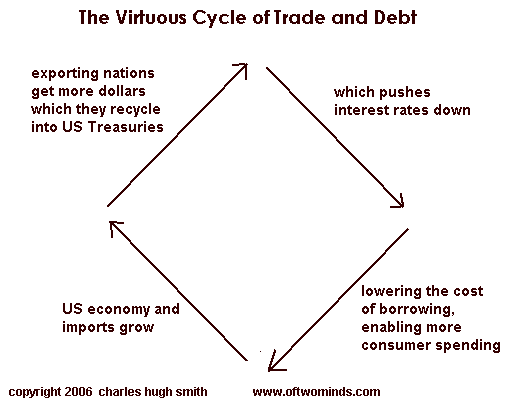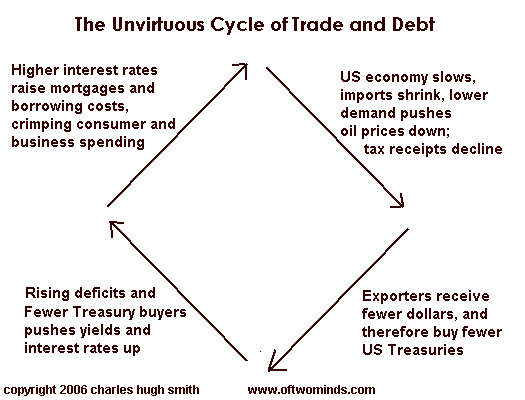| |
When Virtuous Cycles Turn Unvirtuous
(December 20, 2006)
Long-time correspondent S.B. recently recommended the book
The Dollar Crisis: Causes, Consequences, Cures by Richard Duncan. Of the many intriguing dollar-trade topics, let's consider this one: if the U.S. economy sinks into
recession, then U.S. consumers will buy fewer imports, stuffing fewer dollars into the pockets
of exporting nations (Japan, China, OPEC) which will then have fewer dollars to recycle into
U.S. Treasuries. Once these nations can no longer fund our stupendous
debt, then interest rates will rise, sinking the U.S. economy even further.
by Richard Duncan. Of the many intriguing dollar-trade topics, let's consider this one: if the U.S. economy sinks into
recession, then U.S. consumers will buy fewer imports, stuffing fewer dollars into the pockets
of exporting nations (Japan, China, OPEC) which will then have fewer dollars to recycle into
U.S. Treasuries. Once these nations can no longer fund our stupendous
debt, then interest rates will rise, sinking the U.S. economy even further.
I would characterize the past decade of booming imports, rising trade deficits and lower
interest rates as a "virtuous cycle":

If (or when) the U.S. economy stumbles into a recession, the the cycle becomes "unvirtuous,"
i.e. a negative feedback loop of ever-rising interest rates, ever-sinking U.S. economy
and thus ever-lower imports:

For context, let's turn to a link which S.B. kindly provided,
Prudent Bear's Guest Commentary by Richard Duncan which I excerpt here:
As we have already seen, the US Current Account deficits are causing an explosion of the
global money supply which, in turn, has been responsible for the rise of a series of bubble
economies that leave systemic banking crises and deflation behind when they inevitably
implode.
In other words, the United States’ Current Account deficit, by flooding the world with
Dollar liquidity, is creating (in fact, has already created) a global credit bubble of
enormous proportions. It is only a matter of time before something will have to give.
Either government finances will snap under the strain of bailing out failed banking systems,
or deflationary pressure stemming from global excess capacity will undermine corporate
profitability to such an extent that unemployment will soar, causing a backlash against
free trade, or the rest of the world will eventually lose faith in the ability of the United
States to finance its ever growing indebtedness and, in a panic, dump their US
Dollar-denominated debt instruments, making it impossible to finance further deficits.
One way or the other, this global credit bubble will—like every credit bubble before it—
come unwound, the Dollar will lose much of its value, and the US Current Account deficit
will correct.
Unhappily, the correction of the US Current Account deficit will have extraordinarily
damaging impact on the global economy. The world economy has grown dependent on exporting
to the United States. At 500 billion Dollars, the US Current Account deficit is the
equivalent of almost 2% of global GDP—and, that’s before any multiplier effect is taken
into consideration. (NOTE: this was written in 2003; the deficit is now $866 billion.)
The inability of the United States to indefinitely expand its indebtedness to the rest
of the world at the current rate of a Million Dollars a minute means that Asia’s era of
export led growth will soon be coming to a close.
If policy makers don’t come up with a new source of global aggregate demand to replace
that presently created by the US Current Account deficit then the global economy will
not be able to avoid a severe and protracted deflationary slump.
This, therefore, is the point I want to stress: trade imbalances of the magnitude
experienced over the last 25 years cause unsustainable economic bubbles in the surplus
countries which subsequently implode, leaving behind wrecked banking systems, heavily
indebted governments, excess capacity and deflation.
It almost goes without saying that the explosion of global money supply and subsequent
low interest rates fueled a U.S. housing bubble which enabled consumers to borrow vast
sums of equity from their homes. Now that housing is no longer rising (or even dropping
in many locales), consumers' ability to borrow and spend has been severely crimped. This
alone may trigger the "unvirtuous cycle" described above.
Thank you, S.B., for the book recommendation, the link and a wealth of important topics.
A special thank you to the reader who submitted my story
How To Buy a $450K House
for $750K to reddit.com, a link which brought nearly 10,000 new readers to this humble site.
For more on this subject and a wide array of other topics, please visit
my weblog.
copyright © 2006 Charles Hugh Smith. All rights reserved in all media.
I would be honored if you linked this wEssay to your site, or printed a copy for your own use.
|
|



